Affordable, Professional Plumbing Solutions In Phoenix
Neighborhood Plumber & Drain Service offers top-quality plumbing services for both homes and businesses in Phoenix. If you need a professional plumber in Phoenix or nearby areas, call us at
602-755-9098.
Our hundreds of 5-star reviews show that we provide reliable work at fair prices, always ensuring high standards.
Neighborhood Plumber & Drain Service Are Skilled Plumbing Experts in Phoenix...
Our team is trained in all areas of plumbing, delivering top-notch service and quality.
We’ve earned a reputation for professionalism among our residential, retail, restaurant, and business clients.
For fast, dependable, and affordable plumbing services in Phoenix, choose us!

Why Phoenix, Scottsdale, Tempe, Mesa Residents Choose Us For Their Plumbing Needs? Ask Our Customers!

We Are Rated 5-Star On Google...
STATS
Plumbing By The Numbers
Discover the impact of our services through key statistics.
From successful repairs to satisfied customers, our numbers reflect the reliability, expertise, and trust that define our plumbing company.
2800+
Satisfied Clients

4700+
Projects Completed

6+
Expert Plumbers
Why Choose Neighborhood Plumber In Phoenix, Scottsdale, etc?
We're a plumbing specialist, not a handyman or a jack of all trades.
Our skilled plumbers provide a wide range of solutions for any plumbing issue at your home or business. We handle everything including toilets, sinks, faucets, garbage disposals, leak detection, water heaters, whole house re-piping, and drain & septic services.
We serve the Greater Phoenix area, including Phoenix, Tempe, Scottsdale, Glendale, Mesa, Surprise, Peoria, Chandler, Sun City, and nearby areas.
Same-Day Service: Quick and efficient service to meet your plumbing needs fast.
Upfront Pricing, No Surprises: Clear, transparent pricing with no hidden fees.
Highly Trained Technicians: Experts who deliver top-quality, reliable service.
Industry-Leading Warranties: Comprehensive warranties that go beyond industry standards.
Locally Owned & Operated: A trusted local business committed to serving our community.
Financing Available: If you need to finance a major project, we've got you covered with our in-house options.
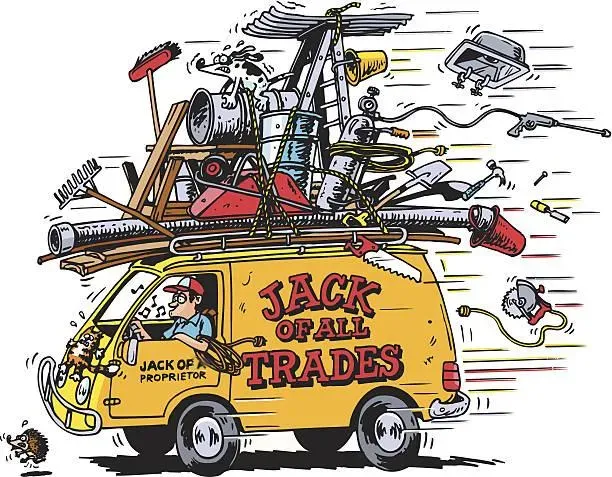
Make Sure You Call An Expert Plumbing Specialist
About Our Company
My name is Forrest Hendershot, founder of Neighborhood Plumber & Drain Service based in Scottsdale, AZ. My team and I service customers valley-wide with fast, quality work.
I started my company because I knew that there was a better way to do business as a plumbing company, and I was determined to do things differently.
Building a trustworthy referral business where customers happily recommend our service to their friends and family was the way I decided to go.
We offer same-day service with competitive, up-front pricing and no hidden fees. We pride ourselves on performing quality, affordable, and honest services to our patrons.
Your complete satisfaction is always our top priority.
Competitive, up-front pricing
Fast, affordable service
Satisfaction guaranteed


We Respond To Your Request Swiftly
Trust our plumbers for quality, professional work. Each residential technician is uniformed, badged, and arrives in a vehicle fully stocked with all the tools and equipment needed to handle any home plumbing issue.
OUR SERVICES
How Can We Assist You Today?
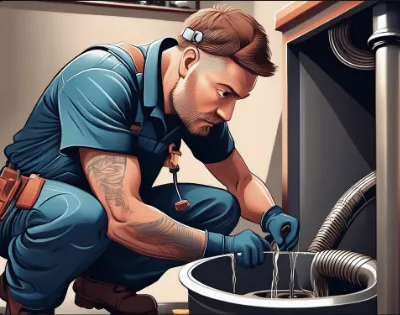
Maintenance
Drain Cleaning
We use the latest equipment and best practices to handle sewer repairs, replacements, cleanings, and inspections quickly and efficiently.
Camera inspections, hydro jetting & trenchless repair systems are what we do best.
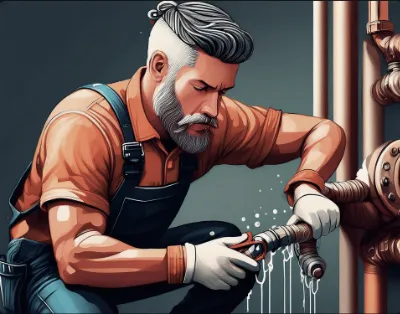
Repair
Fixing Leaky Pipes
Inconsistent water pressure, leaks, or frequent water line problems? At Neighborhood Plumber & Drain Service, we provide expert water line services for homes and businesses.
We specialize in leak detection, system repairs & whole house water line replacement.
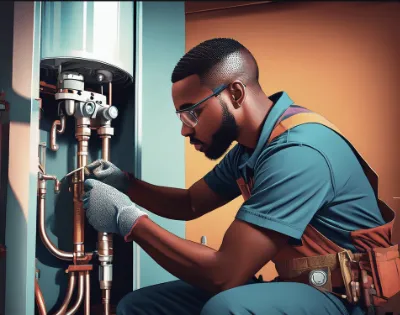
Replace
Water Heaters
A failing water heater can be a hassle since it's a key part of your plumbing system. And let’s face it—no one enjoys a cold shower!
Trust us for reliable water heater service, including conventional gas or electric, or high efficiency tankless systems
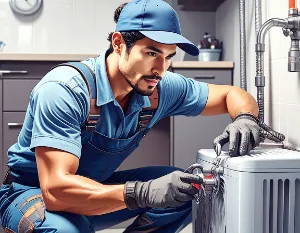
Install & Maintain
Water Softener Systems
Phoenix water is hard and full of unwanted chemicals... Bad for your health and bad for your plumbing & appliances.
If you live in the Phoenix Valley it's almost mandatory to soften, filter and condition your water with a quality whole house water softener & filtration system.
Remodeling, Replacing Water And Sewer Lines, Installing Fixtures, And Any Other Large Project.
Free estimates are offered for jobs more complex than a standard service call.

FREQUENTLY ASKED QUESTIONS
Excellent Service, Outstanding Value!
Trust our plumbers for quality, professional work. Each residential technician is uniformed, badged, and arrives in a vehicle fully stocked with all the tools and equipment needed to handle any home plumbing issue.
Water Heater Servicing And Installation
If your hot water isn’t as hot as you'd like or if you see discolored water from the tap, it might be time to inspect your water heater. Sediment build-up over time can damage the tank. Draining and flushing the tank may be needed to remove these sediments. We recommend having a professional handle water heater repairs to prevent potential issues.
Sewer And Water Line Repair And Maintenance
Like many plumbing issues, a water line leak might start small but will likely worsen if not repaired promptly. It’s wise to call professionals before a minor issue turns into a costly major problem.
Drain Repair And Maintenance
To maintain your drains, regular cleaning is essential. Along with water, your drains face food debris, grease, soap, and hair, making occasional thorough cleaning necessary. If your sinks are draining slower than before, call us—we have solutions to help.
Water Softener & Filtration
Phoenix water is hard - really hard. The minerals in our water supply can damage appliances, leave spots on dishes, and make your skin and hair feel dry. That's why almost every home in the valley needs a water softener system.

Neighborhood Plumber Satisfaction Guarantee:
At Neighborhood Plumber, we’re dedicated to ensuring our customers are 100% satisfied. Our trained technicians work hard to complete every job in a timely manner while maintaining a high level of professionalism.
If you’re not satisfied with our service, please contact us and we promise to make it right!
People Also Ask... Phoenix FAQ's
What is a reasonable price for a plumber?
A reasonable price for plumbing services in Phoenix typically falls between $100 and $150 per hour. Many plumbing companies also offer flat rates for common services, like toilet repairs or faucet replacements. Reasonable pricing should always reflect the plumber’s licensing, quality of work, and warranty on services.
What do I do if I can't afford a plumber?
If you’re unable to afford a plumber, start by asking if the company offers payment plans or financing options—many do, especially for urgent repairs. You can also tackle small fixes yourself with online tutorials, but be careful not to cause bigger problems. Local assistance programs or nonprofits may offer help for low-income homeowners in emergencies.
What is the hourly rate for a plumber in Arizona?
The typical hourly rate for a licensed plumber in Arizona is $100 to $150. For specialized services or emergency situations, hourly charges can be higher. Some jobs are priced per project instead of hourly, so it’s always a good idea to request an upfront estimate.
Do plumbers negotiate prices?
Yes, plumbers may be willing to negotiate—especially for larger projects, or if you're getting multiple services done at once. While many companies use flat-rate pricing for transparency, it's always okay to ask about discounts, bundled pricing, or seasonal promotions.
Why is hiring a plumber so expensive?
Plumbers charge what they do because plumbing involves technical skills, licensing, and liability insurance. They're often available on short notice for emergencies and bring specialized tools and years of expertise. That peace of mind—knowing the job is done right—is part of the cost.
Why do plumbers charge so much per hour?
Hourly rates reflect more than just labor. Plumbers factor in travel time, insurance, tools, training, fuel, and business expenses. Additionally, they're solving high-risk problems that, if done wrong, could cause water damage, mold, or even health hazards.
What do most plumbers make per hour?
In Arizona, employed plumbers typically earn $25 to $45 per hour. Self-employed or master plumbers who run their own businesses often charge much more per hour—up to $100+—to cover overhead and business expenses.
Should I hire a plumber or do it myself?
DIY can be a smart choice for small jobs like unclogging a toilet or replacing a showerhead. But for anything involving sewer lines, gas lines, water heaters, or pipe replacements, it’s best to hire a professional. A licensed plumber will ensure everything is up to code and safe.
How do you find an honest plumber?
Look for plumbers with verified reviews, proper licensing and insurance, and transparent pricing. Check platforms like Google, Yelp, or the BBB, and ask if they offer written estimates and warranties. A reputable plumber will explain your options clearly and won’t pressure you into unnecessary repairs.
What is the most expensive plumbing job?
The most expensive plumbing projects are usually sewer line replacements, water main repairs, or whole-house repiping. These jobs may involve digging, permits, and replacing major infrastructure, with costs ranging from $5,000 to $20,000 or more depending on your home’s layout.
What do plumbers charge for a service call?
In the Phoenix area, service call fees typically range from $50 to $150. This fee covers the plumber’s time and travel to inspect the problem. Some companies will waive the fee if you move forward with the repair work during the same visit.
Contact Us With Your Questions
The fastest way to answer your questions is to call us today for your risk-free inspection appointment at
You can also contact us by email. Just fill out the form here. Give us as much info as you can about your plumbing problem so we can give you the most accurate feedback.
Home | Scottsdale | Phoenix | Tempe | Mesa | Drains | Water Heaters | Trenchless | About | Services | Contact | Near Me
Business Categories: Plumber | Drainage Services | Water Heater System Supplier | Water Softener Equipment Supplier
Location
Based in Scottsdale, AZ, but serving the entire metro Phoenix area
Phone
Hours of Operation
We are available 24/7 via our AI call & messaging system.
